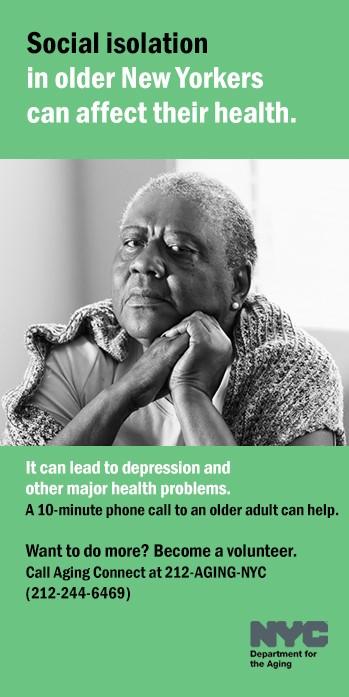Combating Loneliness Among New York’s Elderly: A Growing Public Health Imperative
Recognizing the Escalating Loneliness Crisis in New York’s Senior Community
In the vibrant and fast-moving environment of New York City, a subtle yet serious issue is increasingly affecting the elderly population: chronic loneliness. Far beyond occasional solitude, persistent feelings of isolation are now understood to significantly jeopardize seniors’ mental and physical health. Research reveals that approximately 25% of older adults in New York suffer from enduring loneliness, a figure that underscores the urgency of this hidden epidemic. Contributing factors include bereavement, mobility challenges, shrinking social circles, and the city’s relentless pace, which can leave many seniors feeling disconnected and overlooked.
Tackling this complex problem requires more than raising awareness; it calls for multifaceted solutions that reintegrate seniors into their communities. Effective measures include:
- Senior-Focused Community Activities: Engaging programs such as hobby classes, fitness groups, and cultural events designed to spark social interaction.
- Accessible Transportation Options: Services that help seniors attend social, medical, and recreational appointments with ease.
- Digital Literacy Initiatives: Training to empower older adults to connect virtually with loved ones and access online resources.
- Healthcare Screening for Loneliness: Incorporating routine assessments of social isolation into medical check-ups.
| Contributing Factor | Health Consequence | Recommended Support |
|---|---|---|
| Bereavement | Increased Depression & Anxiety | Peer Support Groups |
| Reduced Mobility | Physical Health Decline | Home-Based Care Visits |
| Decreasing Social Networks | Memory and Cognitive Issues | Community Engagement Programs |
Addressing these challenges demands coordinated action from policymakers, healthcare professionals, and community organizations to protect the well-being of New York’s aging residents.
Health Implications of Social Isolation in Older Adults
Loneliness is not merely an emotional experience but a significant health hazard for seniors. Prolonged social isolation has been linked to a range of adverse outcomes, including heightened risks of cardiovascular disease, mental health disorders, and cognitive impairments. The absence of regular social contact can elevate stress hormone levels, weaken immune defenses, and accelerate the progression of chronic illnesses.
Major health risks associated with isolation include:
- Elevated likelihood of heart-related conditions due to chronic stress and unhealthy lifestyle patterns.
- Increased prevalence of depression and anxiety, often underdiagnosed in elderly populations.
- Faster cognitive deterioration, contributing to higher rates of dementia.
- Delayed or missed medical care, as isolated seniors may avoid or forget appointments.
| Health Condition | Risk Increase | Percentage of Seniors Affected |
|---|---|---|
| Cardiovascular Disease | 30% | 36% |
| Depression | 42% | 29% |
| Cognitive Impairment | 27% | 23% |
| Missed Medical Care | 52% | 31% |
Innovative Community Approaches to Rebuild Social Connections
Across New York, grassroots organizations and neighborhood hubs are developing creative programs to reconnect isolated seniors. Initiatives such as weekly music therapy sessions, intergenerational cooking classes, and neighborhood walking groups provide meaningful opportunities for social engagement. Volunteers are instrumental in offering companionship and practical support, while community spaces like urban farms and shared dining experiences foster a sense of belonging and purpose.
Collaboration between healthcare providers and community organizations enhances outreach, ensuring that vulnerable seniors receive wellness visits, transportation assistance, and mental health support. Recent data from local health assessments demonstrate the effectiveness of these efforts:
| Program | Participants | Reported Benefits |
|---|---|---|
| Art and Music Workshops | 550+ | 55% reduction in loneliness |
| Transportation Services | 320+ | Increased event attendance |
| Community Gardening | 210+ | Improved mental well-being |
- Active social participation correlates with fewer hospitalizations for mental health.
- Volunteer engagement builds a reliable support network for seniors.
- Reliable transportation enhances access to social and healthcare services.
Policy Initiatives to Prioritize Loneliness as a Public Health Concern
Confronting loneliness among New York’s elderly requires a shift in public health policy toward integrated, community-centered solutions. Expanding affordable social programs that encourage daily interpersonal connections is vital. Investments in senior centers, volunteer-driven outreach, and intergenerational activities can foster inclusion. Furthermore, promoting digital access and training ensures seniors remain connected in an increasingly online world.
Recommended policy measures include:
- Implementing mandatory loneliness screenings during routine healthcare visits to identify isolated individuals early.
- Allocating funds for mobile outreach teams that provide home visits and connect homebound seniors to community resources.
- Strengthening partnerships between healthcare systems and nonprofits to streamline referrals and support services.
| Policy Focus | Action Steps | Anticipated Results |
|---|---|---|
| Healthcare Integration | Routine loneliness assessments | Timely detection of social isolation |
| Community Programs | Expand senior engagement activities | Greater social involvement |
| Digital Inclusion | Provide technology access and education | Enhanced connectivity and support |
Final Thoughts
As the number of older adults in New York continues to rise, the silent epidemic of loneliness demands urgent attention. By fostering innovative community programs, improving access to mental health care, and strengthening social support networks, we can alleviate the profound emotional and physical toll of isolation. Proactive, collaborative efforts are essential to ensure that New York’s seniors can enjoy their later years with dignity, connection, and robust health.













